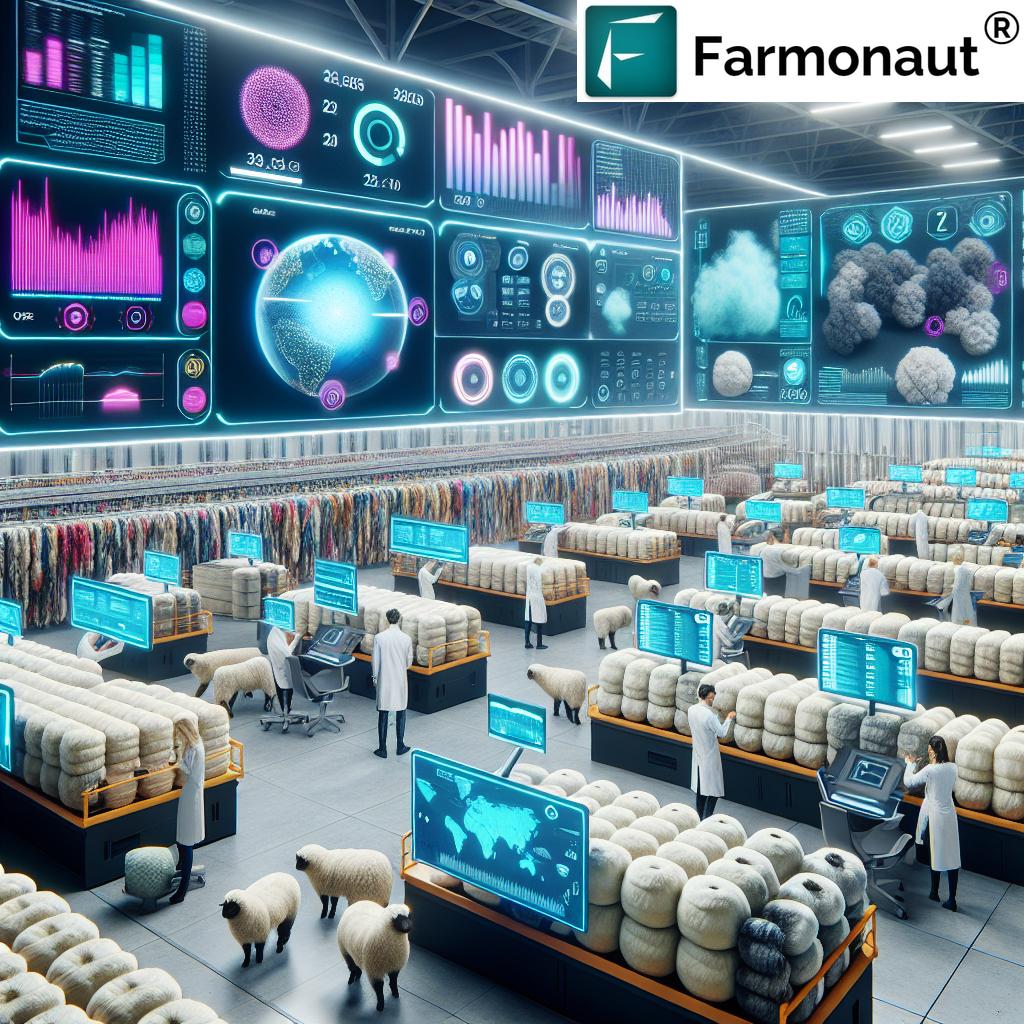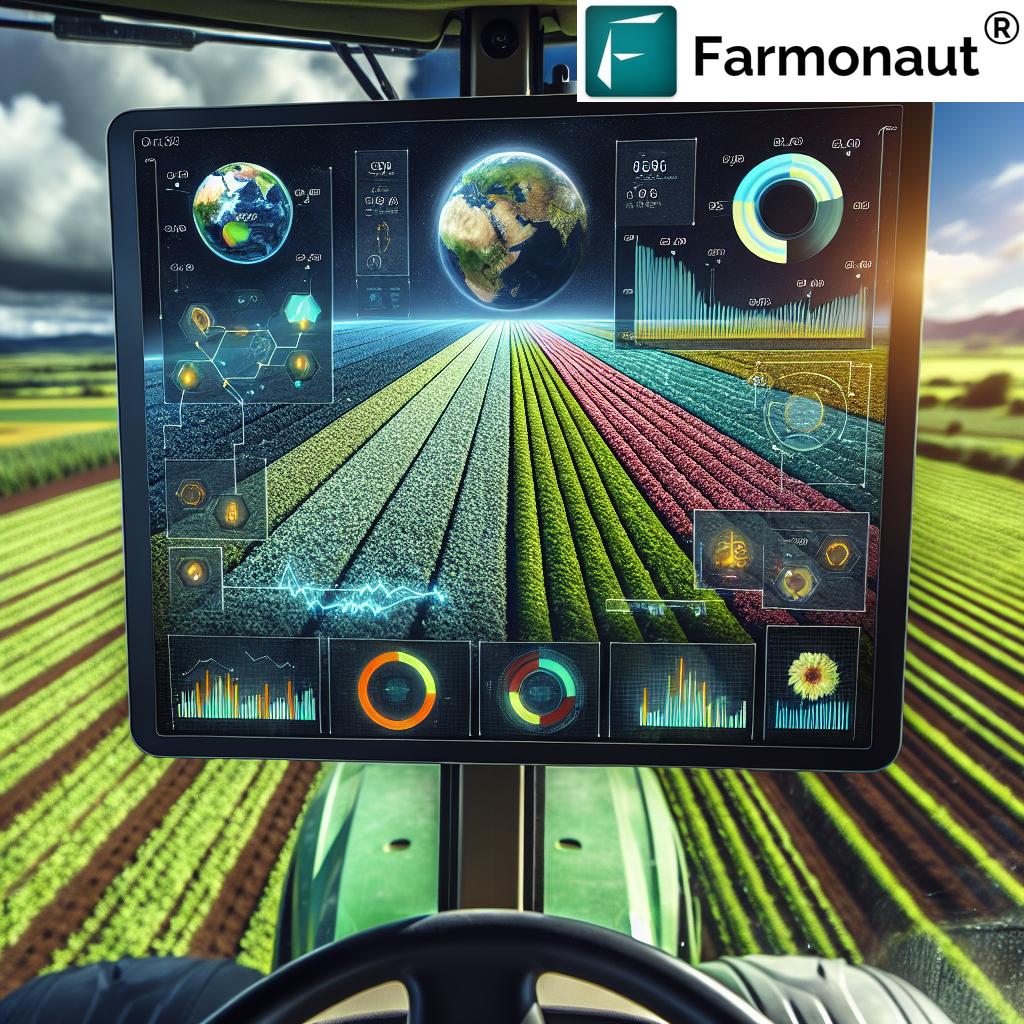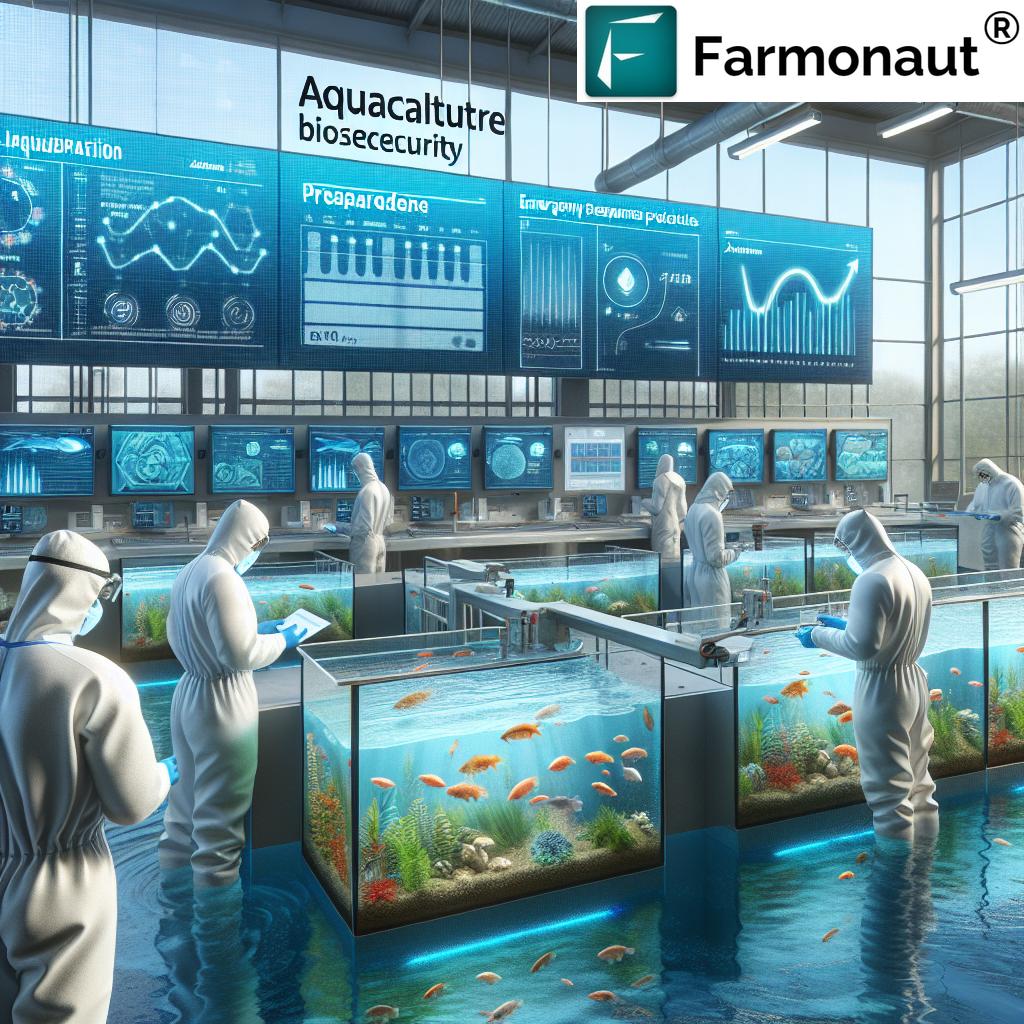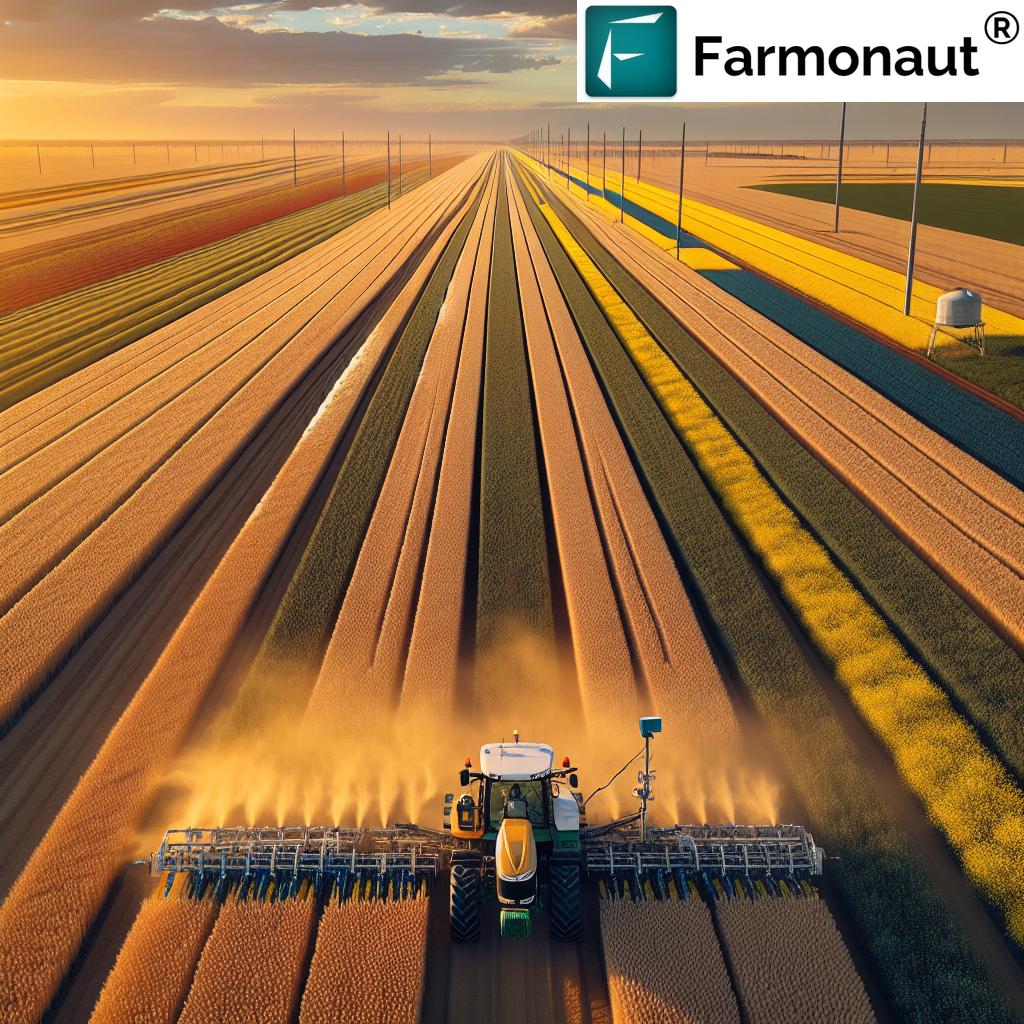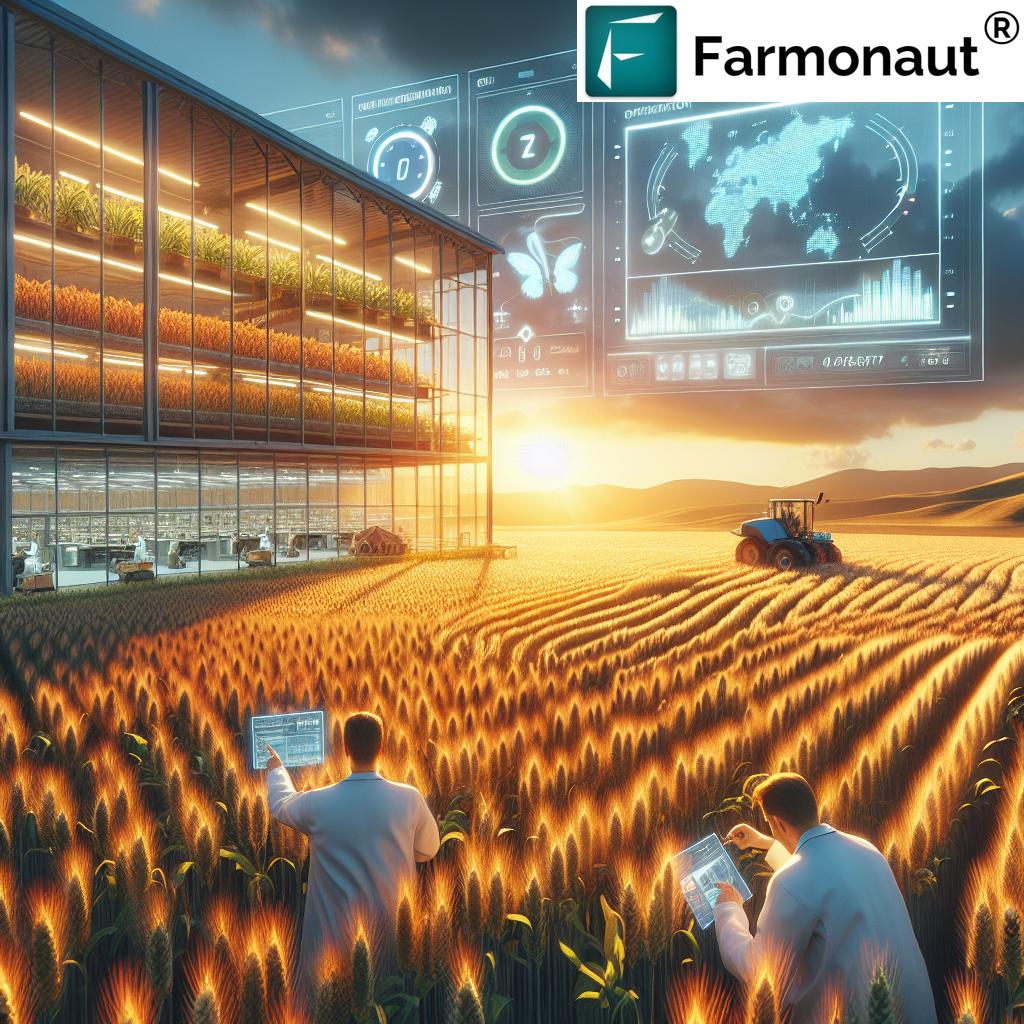Revolutionizing Australian Agriculture: Farmonaut’s Precision Technology for Sustainable Farming in a Changing Climate
“Australian agriculture contributes to 12% of the country’s GDP and employs over 300,000 people across various sectors.”
In the vast expanse of Australia’s agricultural landscape, we find ourselves at a pivotal moment. As stewards of the land, we face unprecedented challenges that demand innovative solutions. The intersection of climate change, biosecurity threats, and the need for sustainable farming practices has created a complex web of issues that require our immediate attention. In this comprehensive exploration, we delve into the heart of Australian agriculture, examining the hurdles we face and the groundbreaking technologies that are reshaping our approach to farming.
At the forefront of this agricultural revolution stands Farmonaut, a pioneering force in precision agriculture technology. Through its cutting-edge satellite-based solutions, Farmonaut is not just addressing current challenges but is actively shaping the future of sustainable farming in Australia. As we navigate through this blog post, we’ll uncover how Farmonaut’s innovative platform is transforming the way we approach crop health monitoring, resource management, and data-driven decision-making in agriculture.
The Changing Face of Australian Agriculture
Australian agriculture is a cornerstone of our national identity and economy. However, the sector is undergoing rapid transformation due to various factors:
- Climate Change Impact: Rising temperatures, altered rainfall patterns, and extreme weather events are significantly affecting crop yields and livestock productivity.
- Biosecurity Threats: The increasing movement of goods and people globally has heightened the risk of pest and disease outbreaks in our agricultural systems.
- Water Scarcity: Droughts and competing water demands are putting pressure on our irrigation systems and water resources.
- Soil Degradation: Intensive farming practices have led to soil erosion and loss of fertility in many regions.
- Market Volatility: Fluctuating global markets and trade tensions are impacting our agricultural exports and farmer incomes.
These challenges call for a paradigm shift in how we approach farming. This is where precision agriculture and sustainable farming practices come into play, with Farmonaut leading the charge in technological innovation.
[Image 1]
Farmonaut: Pioneering Precision Agriculture in Australia
Farmonaut is at the vanguard of the agricultural technology revolution, offering a comprehensive suite of tools designed to address the multifaceted challenges facing Australian farmers. Let’s explore how Farmonaut’s innovative solutions are making a tangible difference:
1. Satellite-Based Crop Health Monitoring
Farmonaut’s advanced satellite imagery technology provides farmers with real-time insights into crop health. By analyzing multispectral data, the platform offers:
- Vegetation health indices (NDVI) to assess crop vigor
- Soil moisture level monitoring for optimal irrigation management
- Early detection of crop stress and disease outbreaks
This level of precision allows farmers to make data-driven decisions, optimizing resource use and maximizing yields.
2. AI-Powered Advisory System: Jeevn AI
Farmonaut’s Jeevn AI is a game-changer in personalized farm management. This intelligent system:
- Analyzes satellite data and local conditions to provide tailored crop management advice
- Offers real-time weather forecasts and alerts
- Suggests optimal timing for planting, irrigation, and harvesting
By leveraging artificial intelligence, Jeevn AI acts as a virtual agronomist, helping farmers make informed decisions that boost productivity and efficiency.
3. Blockchain-Based Traceability
In an era where consumers demand transparency, Farmonaut’s blockchain technology offers:
- End-to-end traceability of agricultural products
- Enhanced food safety and quality assurance
- Support for sustainable and ethical farming practices
This feature not only builds consumer trust but also opens up new market opportunities for Australian farmers in the global arena.
4. Resource and Fleet Management
Efficient resource utilization is crucial for sustainable farming. Farmonaut’s platform includes:
- Tools for optimizing agricultural machinery usage
- Logistics management for large-scale operations
- Resource allocation strategies to minimize waste and maximize efficiency
These features are particularly valuable for large agribusinesses and cooperatives managing extensive operations across Australia.
5. Carbon Footprint Tracking
As sustainability becomes increasingly important, Farmonaut offers:
- Real-time monitoring of carbon emissions from farming activities
- Strategies for reducing environmental impact
- Support for compliance with environmental regulations
This feature not only helps farmers contribute to climate change mitigation but also positions them favorably in a market increasingly focused on sustainable production.
Access Farmonaut’s innovative solutions:
Addressing Key Challenges in Australian Agriculture
Let’s delve deeper into how Farmonaut’s technology is specifically addressing some of the most pressing challenges in Australian agriculture:
Climate Change Adaptation
“Climate change could reduce agricultural productivity in Australia by up to 17% by 2050 without adaptive measures.”
The changing climate poses significant risks to Australian agriculture, including:
- Increased frequency and severity of droughts
- Shifting growing seasons
- New pest and disease pressures
Farmonaut’s platform aids in climate change adaptation through:
- Precision irrigation systems that optimize water use
- Crop variety recommendations based on changing climate patterns
- Early warning systems for extreme weather events
By leveraging these tools, Australian farmers can build resilience against climate-related risks and maintain productivity in the face of environmental challenges.
Biosecurity Management
Protecting Australia’s agricultural sector from biosecurity threats is paramount. Farmonaut contributes to this effort by:
- Providing early detection of pest and disease outbreaks through satellite imagery analysis
- Facilitating rapid response to potential threats through real-time alerts
- Supporting traceability efforts to contain and manage biosecurity incidents
These capabilities enhance Australia’s ability to safeguard its agricultural industries and maintain its reputation for high-quality, disease-free produce in the global market.
Water Resource Management
In a country prone to drought, efficient water use is critical. Farmonaut’s technology supports sustainable water management through:
- Soil moisture monitoring to optimize irrigation schedules
- Drought stress detection in crops for timely interventions
- Water use efficiency analysis to reduce wastage
By implementing these strategies, Australian farmers can maximize their water resources, especially in drought-prone regions.
[Image 2]
Sustainable Farming Practices Enabled by Farmonaut
Farmonaut’s technology is not just about addressing challenges; it’s about fostering sustainable farming practices that will secure the future of Australian agriculture. Here’s how:
Precision Nutrient Management
Farmonaut’s satellite imagery and AI analysis enable:
- Targeted application of fertilizers based on crop needs
- Reduction in over-fertilization, minimizing environmental impact
- Optimization of nutrient use efficiency, reducing costs for farmers
Integrated Pest Management
The platform supports sustainable pest control through:
- Early detection of pest infestations using satellite imagery
- Targeted application of pesticides, reducing overall chemical use
- Promotion of biological control methods where appropriate
Soil Health Improvement
Farmonaut aids in maintaining and improving soil health by:
- Monitoring soil organic matter levels
- Recommending crop rotation strategies to enhance soil fertility
- Identifying areas prone to erosion for targeted conservation efforts
Biodiversity Conservation
The technology supports biodiversity on farms through:
- Mapping of natural habitats and wildlife corridors
- Recommendations for integrating conservation areas within agricultural landscapes
- Monitoring the impact of farming practices on local ecosystems
Explore Farmonaut’s API for custom integrations: Farmonaut API
Access detailed developer documentation: API Developer Docs
The Economic Impact of Precision Agriculture in Australia
The adoption of precision agriculture technologies like Farmonaut has significant economic implications for Australian agriculture:
- Increased Productivity: Precision farming can lead to yield increases of up to 15% in certain crops.
- Cost Reduction: Efficient resource use can result in input cost savings of 10-20%.
- Market Access: Traceability and sustainable practices open up premium markets for Australian produce.
- Risk Mitigation: Early detection and prevention of crop issues reduce the financial impact of losses.
By leveraging Farmonaut’s technology, Australian farmers can improve their bottom line while contributing to a more sustainable agricultural sector.
The Future of Australian Agriculture with Farmonaut
As we look to the future, Farmonaut’s role in shaping Australian agriculture becomes even more critical. Here are some key areas where we anticipate significant advancements:
1. AI-Driven Predictive Analytics
Farmonaut’s AI capabilities will continue to evolve, offering:
- More accurate yield predictions
- Advanced risk assessment models for climate and market fluctuations
- Personalized crop management plans based on historical data and future projections
2. Integration with IoT and Robotics
We expect to see Farmonaut’s platform integrating with:
- IoT sensors for real-time field data collection
- Autonomous farming equipment for precision operations
- Drones for high-resolution imagery and targeted interventions
3. Enhanced Genetic Selection
Farmonaut’s data analytics will support:
- Identification of crop varieties best suited to specific microclimates
- Breeding programs for climate-resilient and high-yield crops
- Optimization of crop placement based on genetic traits and environmental conditions
4. Carbon Market Participation
As carbon markets develop, Farmonaut will facilitate:
- Accurate measurement of carbon sequestration in agricultural practices
- Verification of carbon credits for farmers
- Integration with carbon trading platforms for additional farm income
Challenges and Considerations
While the potential of Farmonaut’s technology is immense, it’s important to address some challenges and considerations:
1. Digital Literacy and Adoption
Ensuring widespread adoption of precision agriculture technologies requires:
- Training programs for farmers and agricultural workers
- User-friendly interfaces and intuitive design of digital tools
- Support systems for troubleshooting and ongoing assistance
2. Data Privacy and Security
As farm data becomes increasingly valuable, it’s crucial to:
- Implement robust data protection measures
- Establish clear guidelines on data ownership and usage
- Ensure transparency in how farm data is collected and utilized
3. Equitable Access
Ensuring that precision agriculture benefits all farmers, regardless of size or location, involves:
- Developing scalable solutions suitable for small and large operations
- Addressing connectivity issues in remote areas
- Creating flexible pricing models to accommodate different farm sizes and budgets
4. Integration with Existing Systems
For seamless adoption, Farmonaut’s technology needs to:
- Interface with existing farm management software
- Integrate with legacy equipment and systems
- Provide open APIs for custom integrations and third-party development
Australian Agriculture Challenges and Farmonaut Solutions Matrix
| Challenge Category | Specific Issue | Impact on Agriculture | Farmonaut Solution |
|---|---|---|---|
| Climate Change | Increased temperatures and altered rainfall patterns | Reduced crop yields (up to 30% in some regions) | AI-driven crop variety recommendations and precision irrigation (potential 20% yield improvement) |
| Biosecurity Threats | Invasive species and disease outbreaks | Economic losses of up to $13 billion annually | Early detection through satellite imagery and AI analysis (up to 60% faster response time) |
| Water Scarcity | Prolonged droughts and competing water demands | 25% reduction in irrigated agriculture output | Precision irrigation and soil moisture monitoring (up to 30% water savings) |
| Pest Management | Increased pest pressure due to climate change | Crop losses of 20-40% in affected areas | AI-powered pest detection and targeted treatment recommendations (potential 50% reduction in pesticide use) |
| Soil Degradation | Erosion and loss of soil fertility | 15% decrease in agricultural productivity | Satellite-based soil health monitoring and conservation recommendations (up to 25% improvement in soil organic matter) |
Policy Implications and Government Support
The successful integration of precision agriculture technologies like Farmonaut into Australian farming practices requires supportive policies and government initiatives. Key areas for consideration include:
1. Rural Connectivity
Improving digital infrastructure in rural areas is crucial for the widespread adoption of precision agriculture. Government initiatives should focus on:
- Expanding broadband and mobile network coverage in agricultural regions
- Subsidizing satellite internet services for remote farms
- Developing community-based digital hubs for shared access to technology
2. Research and Development Grants
Continued innovation in agricultural technology requires ongoing investment. Policy measures should include:
- Increased funding for agritech research and development
- Collaborative research programs between universities, government agencies, and private companies like Farmonaut
- Incentives for farmers to participate in field trials and technology testing
3. Education and Training
Building digital literacy in the agricultural sector is essential. Government support should encompass:
- Integration of precision agriculture courses in agricultural education curricula
- Funding for vocational training programs in agritech
- Support for extension services to provide on-farm technology guidance
4. Regulatory Framework
Developing appropriate regulations to govern the use of precision agriculture technologies is crucial. This includes:
- Establishing data ownership and privacy standards for farm data
- Creating guidelines for the use of drones and autonomous vehicles in agriculture
- Developing standards for interoperability between different agritech platforms
5. Financial Incentives
Encouraging adoption of sustainable farming practices through financial measures, such as:
- Tax incentives for investments in precision agriculture technologies
- Low-interest loans for technology upgrades on farms
- Payments for ecosystem services to farmers implementing sustainable practices
The Role of Farmonaut in Shaping Agricultural Policy
As a leader in precision agriculture technology, Farmonaut plays a crucial role in informing and shaping agricultural policy in Australia. The company’s contributions include:
- Data-Driven Insights: Providing policymakers with accurate, real-time data on agricultural trends and challenges
- Technology Demonstrations: Showcasing the potential of precision agriculture to government officials and stakeholders
- Collaborative Research: Partnering with government agencies and research institutions to advance agricultural science
- Policy Recommendations: Offering expert input on technology-related aspects of agricultural policy
By leveraging its expertise and data analytics capabilities, Farmonaut helps ensure that agricultural policies are well-informed, forward-thinking, and aligned with the needs of modern farming practices.
Farmonaut’s Commitment to Sustainable Agriculture
At the core of Farmonaut’s mission is a deep commitment to promoting sustainable agriculture. This commitment is reflected in various aspects of the company’s operations and technology offerings:
1. Environmental Stewardship
Farmonaut’s technologies are designed to minimize the environmental impact of farming by:
- Reducing chemical inputs through precision application
- Optimizing water use to conserve this precious resource
- Promoting practices that enhance soil health and biodiversity
2. Economic Sustainability
By improving efficiency and productivity, Farmonaut helps ensure the long-term economic viability of farms through:
- Cost savings on inputs and resources
- Increased crop yields and quality
- Access to premium markets through traceability and sustainability credentials
3. Social Responsibility
Farmonaut recognizes the importance of supporting rural communities and promotes:
- Knowledge sharing and capacity building among farmers
- Collaboration with local agricultural organizations and cooperatives
- Support for young farmers and agricultural entrepreneurs
4. Continuous Innovation
To address evolving agricultural challenges, Farmonaut is committed to:
- Ongoing research and development in precision agriculture technologies
- Adapting solutions to meet the specific needs of Australian agriculture
- Collaborating with farmers to co-create practical, effective tools
Conclusion: A Sustainable Future for Australian Agriculture
As we navigate the complexities of modern agriculture in Australia, the role of innovative technologies like those offered by Farmonaut becomes increasingly crucial. By embracing precision agriculture, we can address the challenges of climate change, biosecurity threats, and resource scarcity while promoting sustainable farming practices.
Farmonaut’s comprehensive suite of tools – from satellite-based crop monitoring to AI-driven advisory systems – provides Australian farmers with the means to optimize their operations, reduce environmental impact, and improve profitability. As we look to the future, the continued development and adoption of these technologies will be key to ensuring the resilience and sustainability of Australian agriculture.
The journey towards a more sustainable and technologically advanced agricultural sector requires collaboration between farmers, technology providers like Farmonaut, policymakers, and researchers. By working together, we can create an agricultural landscape that is not only productive and profitable but also environmentally sustainable and socially responsible.
As we conclude, we invite Australian farmers, agribusinesses, and policymakers to explore the possibilities that Farmonaut’s precision agriculture solutions offer. Together, we can build a future where Australian agriculture continues to thrive, adapting to new challenges and seizing new opportunities in an ever-changing world.
FAQs
- Q: How does Farmonaut’s satellite technology work for crop monitoring?
A: Farmonaut uses multispectral satellite imagery to analyze various aspects of crop health, including vegetation indices and soil moisture. This data is processed using advanced algorithms to provide actionable insights to farmers. - Q: Is Farmonaut’s technology suitable for small-scale farmers?
A: Yes, Farmonaut offers scalable solutions that can be adapted for farms of all sizes, from small family operations to large commercial enterprises. - Q: How does Farmonaut contribute to water conservation in agriculture?
A: Farmonaut’s precision irrigation recommendations, based on satellite data and AI analysis, help farmers optimize water use, reducing waste and improving efficiency. - Q: Can Farmonaut’s technology help with biosecurity management?
A: Yes, Farmonaut’s early detection capabilities can identify potential pest and disease outbreaks, allowing for rapid response and containment. - Q: How does Farmonaut support sustainable farming practices?
A: Farmonaut promotes sustainability through precision resource management, reduced chemical use, and data-driven decision-making that minimizes environmental impact.






